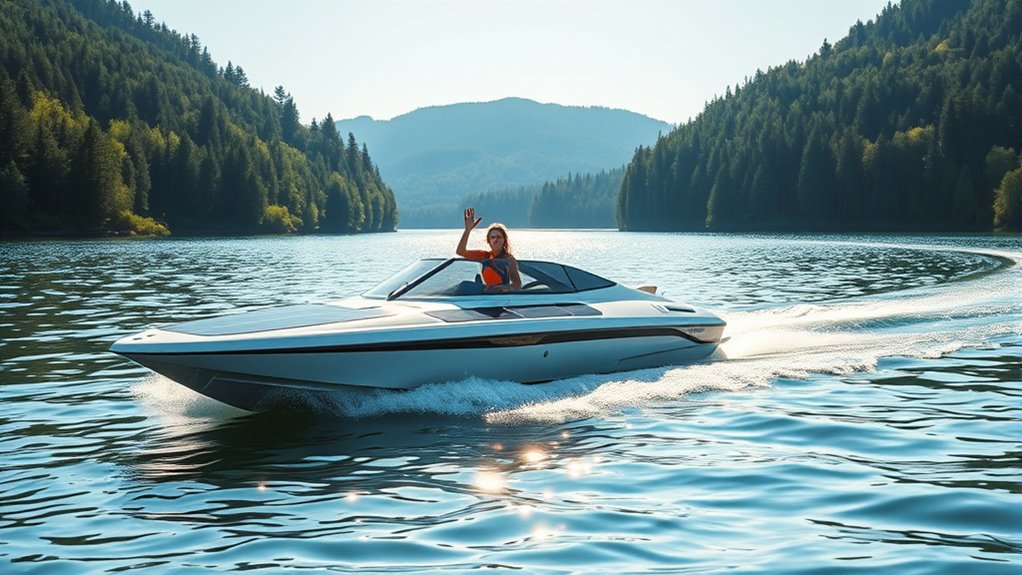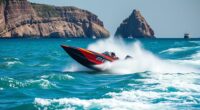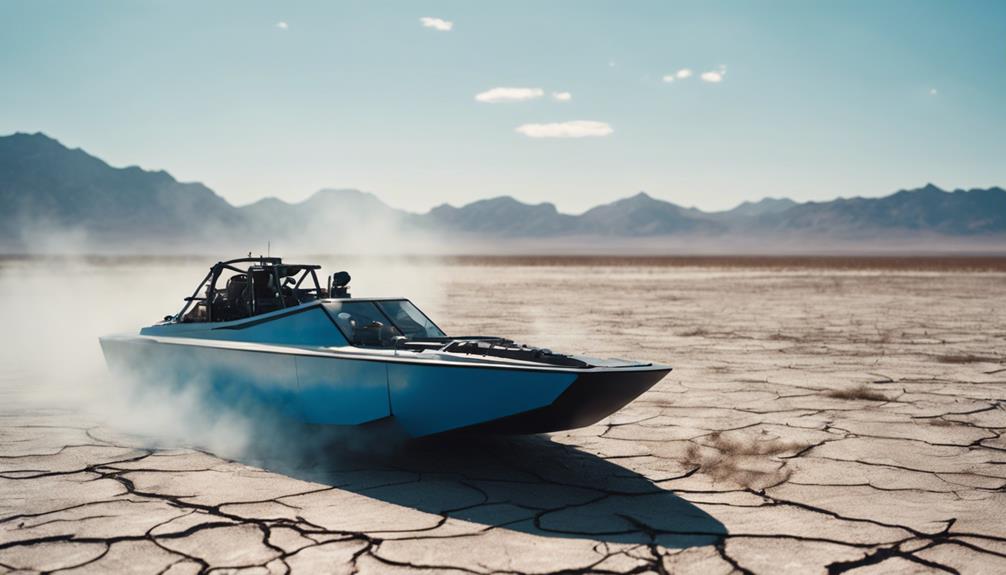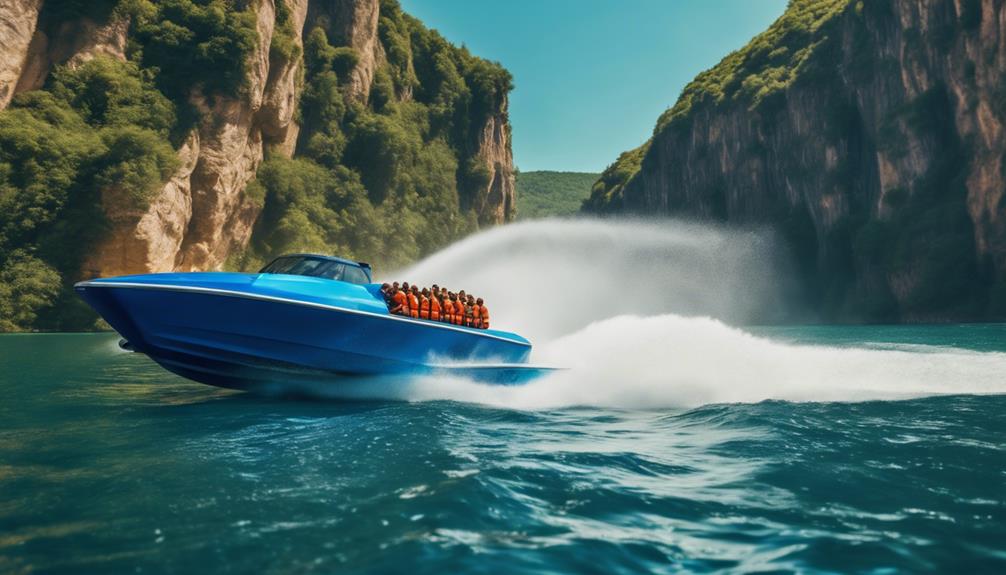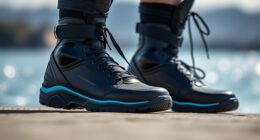To practice eco-friendly jet boating, choose cleaner engines like electric or hybrid models and maintain them regularly. Operate responsibly by sticking to designated routes, reducing speed near shorelines, and avoiding wildlife disturbances. Minimize noise pollution with sound-dampening upgrades and proper engine maintenance. Manage waste carefully and prevent spills to protect water quality. Supporting sustainable practices helps preserve ecosystems and wildlife. Keep these tips in mind to enjoy water adventures while safeguarding our aquatic environments—further insights await your curiosity.
Key Takeaways
- Use hybrid or electric engines and sustainable materials to minimize environmental impact.
- Follow responsible operating practices like maintaining safe distances from wildlife and avoiding sensitive habitats.
- Reduce noise pollution by choosing quieter engines and performing regular maintenance.
- Properly dispose of waste and prevent fuel or oil spills through routine inspections and spill response readiness.
- Support ecosystem health by adhering to local regulations, limiting wake, and protecting water quality.
Choosing Environmentally Friendly Equipment
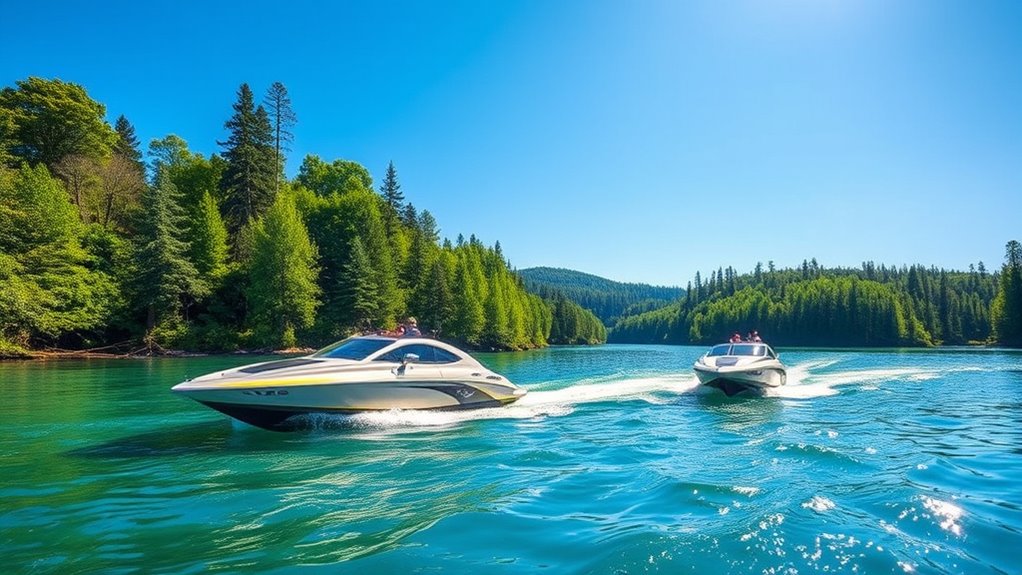
When selecting equipment for jet boating, opting for environmentally friendly options can make a significant difference. Choose engines that run on cleaner fuels or are designed to reduce emissions, like hybrid or electric models. These alternatives produce fewer pollutants and help preserve water quality. Look for boat components made from recycled or sustainable materials, such as biodegradable lubricants or eco-certified hulls. Investing in advanced filtration systems can also minimize oil and fuel leaks, preventing contamination. Additionally, select safety gear and accessories that are durable and environmentally responsible. By prioritizing eco-friendly equipment, you not only reduce your carbon footprint but also contribute to the health of aquatic ecosystems, ensuring that jet boating remains sustainable for future generations. Incorporating high-efficiency engines can further optimize fuel consumption and reduce environmental impact.
Maintaining Your Jet Boat for Optimal Efficiency

Regular maintenance is essential to keep your jet boat running at peak efficiency and minimize environmental impact. Regularly check and clean your engine, removing debris and buildup that can reduce performance. Change the oil and replace filters according to the manufacturer’s schedule to guarantee smooth operation. Inspect the impeller for damage, as a damaged impeller decreases fuel efficiency and increases emissions. Keep the cooling system clean to prevent overheating and maintain ideal performance. Properly inflate and maintain your tires or trailer components to avoid unnecessary wear. Additionally, inspect hoses and connections for leaks or cracks. Incorporating Ford Tuning techniques can further optimize your boat’s engine performance and fuel efficiency. Staying aware of pinball machine angles can lead to better engine behavior and efficiency, as proper positioning ensures consistent operation. Utilizing maintenance schedules helps you stay on top of essential tasks and prolongs your boat’s lifespan. Being mindful of environmentally friendly practices during maintenance reduces your ecological footprint and promotes sustainable boating. Regularly reviewing your boat’s environmental impact can help identify additional ways to reduce emissions and conserve resources. By staying proactive with maintenance, you reduce fuel consumption, lower emissions, and extend your jet boat’s lifespan, all while supporting eco-friendly boating practices.
Operating Your Jet Boat Responsibly
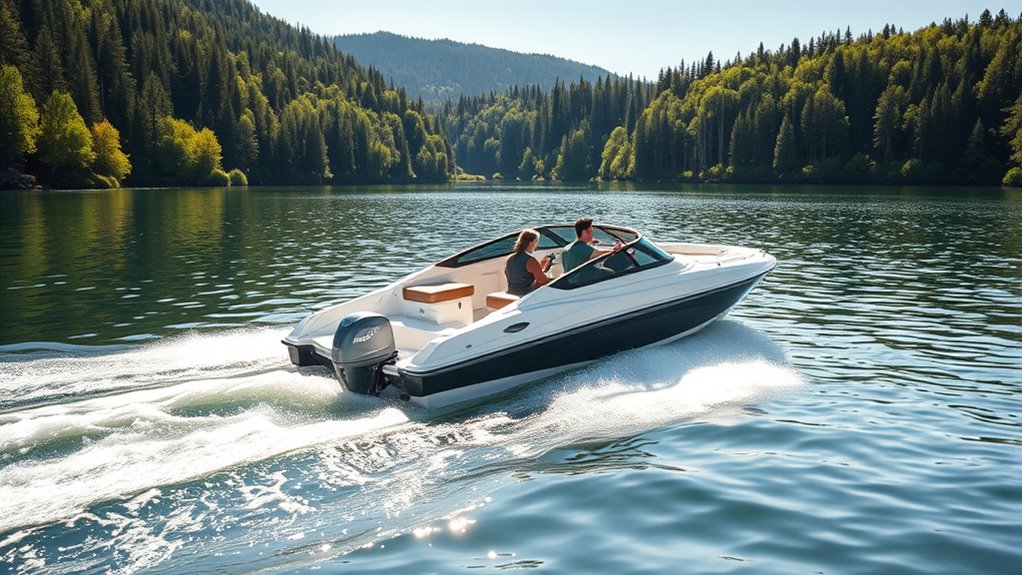
Keeping your jet boat well-maintained helps it run efficiently and reduces environmental impact, but how you operate it also makes a big difference. Always follow speed limits and avoid sudden acceleration or abrupt stops, which increase fuel consumption and emissions. Stick to designated channels and avoid shallow areas to prevent damage to aquatic habitats. Use smooth, deliberate maneuvers to minimize wake and shoreline erosion. Turn off your engine when idling for extended periods to conserve fuel and reduce noise. Respect wildlife and other boaters by maintaining a safe distance. Properly dispose of waste and avoid discharging gray water into natural water bodies. Additionally, understanding the power consumption of your boat’s systems can help you operate more sustainably. Monitoring your electric motor horsepower and ensuring it is appropriately matched to your boat size can improve efficiency. Being aware of the environmental impact of your boating activities encourages more responsible practices. Implementing home decor principles such as reducing waste and choosing eco-friendly materials can further lessen your environmental footprint. By operating your jet boat responsibly, you protect the environment, ensure safety, and promote sustainable boating practices for everyone to enjoy.
Minimizing Noise Pollution
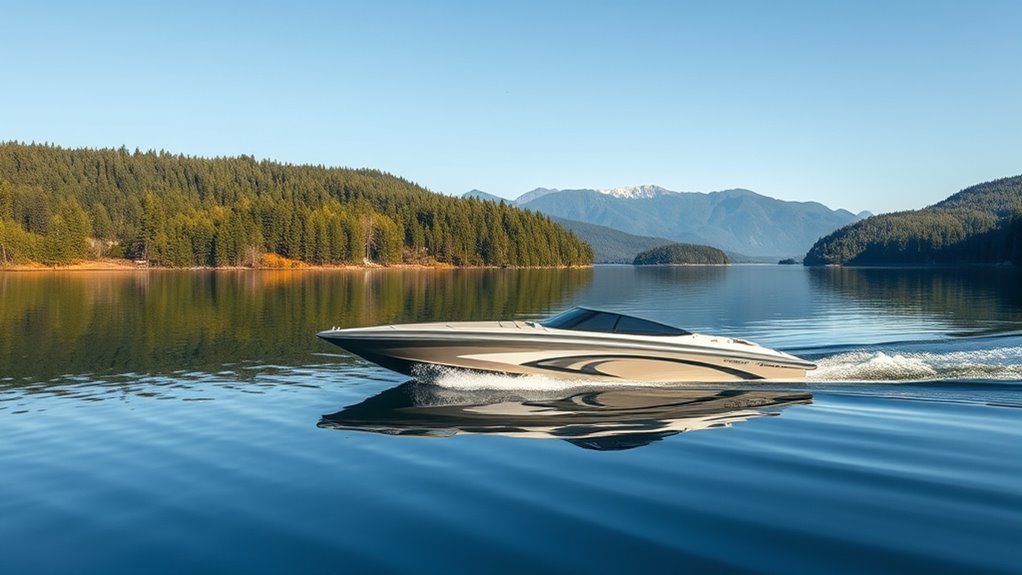
To reduce noise pollution from your jet boat, consider upgrading to quieter engines that produce less sound. Always keep a respectful distance from other boats and shoreline areas to minimize disturbance. By making these choices, you can enjoy your ride while protecting the environment and your fellow boaters. Additionally, adopting soundproofing techniques on your boat can further diminish noise levels and enhance the overall experience. Incorporating these methods can also improve environmental impact, ensuring that your boating activities remain sustainable. Using noise-reducing materials in your boat’s construction can significantly lower sound emissions and contribute to a more eco-friendly outing.
Use Quieter Engines
While jet boats are known for their speed and agility, traditional engines often produce loud noise that disturbs wildlife and nearby communities. To minimize this impact, you should consider using quieter engines. These engines operate at lower decibel levels, reducing noise pollution markedly. Here’s how you can make a difference:
- Choose electric or hybrid engines that produce less noise than conventional options.
- Regularly maintain your engine to ensure it runs smoothly and quietly.
- Install sound-dampening materials around the engine compartment to absorb excess noise.
- Explore the benefits of remote hackathons to collaborate on developing even quieter boating technologies and solutions.
- Incorporating AI-driven innovations can also help optimize engine performance and noise reduction efforts.
- Understanding and adhering to local regulations can help ensure your boat operates within permissible noise levels and supports community well-being.
- Selecting engines with noise-canceling technology can further enhance efforts to reduce sound emissions during operation.
- Additionally, opting for engines with noise reduction features can significantly diminish overall sound output during use.
Maintain Proper Distance
Maintaining a proper distance from wildlife and shoreline habitats is essential for minimizing noise pollution from jet boats. When you keep a respectful distance, you reduce the disturbance and prevent startling animals or disturbing their natural behaviors. Always follow local guidelines or regulations that specify safe distances, and avoid approaching wildlife or sensitive areas closely. Proper distance also helps in reducing noise pollution, ensuring that the natural soundscape remains undisturbed. By doing so, you help preserve the tranquility of the environment and prevent noise from traveling further than necessary. Slow down as you near shoreline areas, and steer clear of crowded or protected zones. Your awareness and careful navigation ensure that your jet boating activities remain eco-friendly, supporting the health of ecosystems and the safety of wildlife. Maintaining proper distance also supports ecosystem preservation, which is vital for sustaining biodiversity. Additionally, being aware of local environmental regulations can help you stay compliant and further minimize your ecological impact. Proper distance is a simple yet impactful way to minimize your noise footprint. Being mindful of cultural intelligence helps ensure that recreational activities do not harm the natural surroundings.
Proper Waste Disposal and Spill Prevention
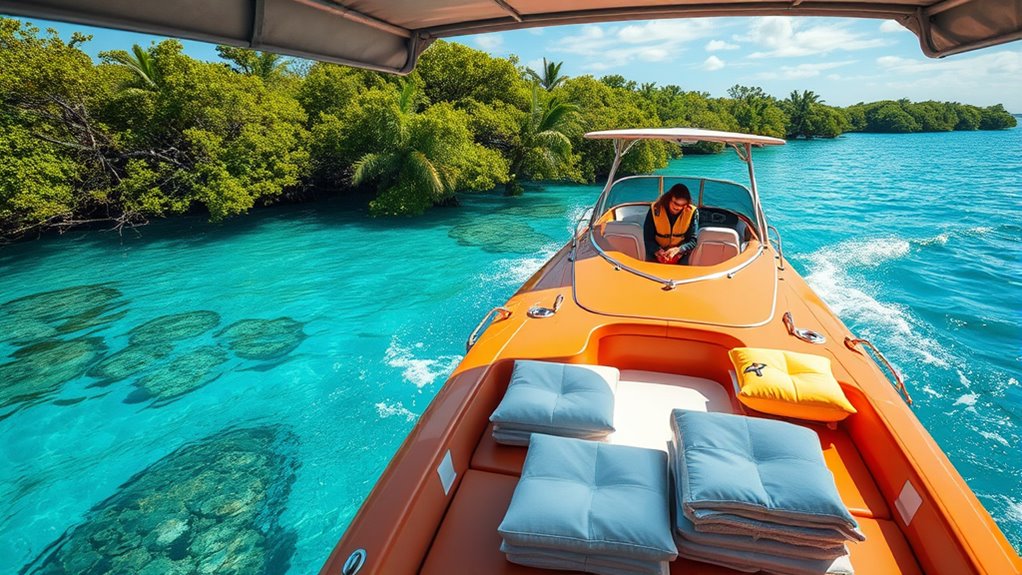
You play a key role in preventing environmental harm by properly segregating your waste and following spill response procedures. Using eco-friendly disposal methods helps safeguard waterways and wildlife from contamination. By staying vigilant and prepared, you can ensure your jet boating remains safe and environmentally responsible.
Proper Waste Segregation
Proper waste segregation is essential to prevent environmental contamination during jet boating activities. By sorting waste correctly, you help protect water quality and wildlife. Here are three key steps to guarantee proper waste segregation:
- Separate recyclables and non-recyclables: Keep plastics, cans, and paper apart from general trash.
- Use designated containers: Clearly label bins for different waste types to avoid cross-contamination.
- Dispose of hazardous waste properly: Store fuel, oil, and chemicals separately and follow local disposal regulations.
Implementing these practices reduces pollution and supports eco-friendly boating. Always check local guidelines for waste disposal, and encourage your crew to stay vigilant. Proper waste segregation is a simple yet powerful way to minimize your environmental impact and promote sustainable jet boating.
Spill Response Procedures
To effectively prevent spills and safeguard the environment during jet boating, it’s crucial to have clear spill response procedures in place. First, familiarize yourself with the locations of spill response kits on your vessel. In case of a spill, act quickly by containing the spill using absorbent materials and barriers to prevent it from spreading. Always notify the appropriate authorities and your crew promptly. Keep safety equipment accessible and ensure everyone knows their role in the response. Preventing spills involves regular inspections of fuel and oil systems for leaks. After managing the spill, clean the area thoroughly and document the incident. Proper training and preparedness help minimize environmental impact and ensure a swift, effective response to any spill during your jet boating trip.
Eco-Friendly Disposal Methods
Implementing eco-friendly disposal methods is essential for minimizing environmental impact during jet boating. Proper waste disposal prevents pollution and protects aquatic ecosystems. To do this effectively, focus on these key practices:
- Always carry biodegradable waste bags to collect trash, ensuring it doesn’t end up in the water.
- Use designated disposal sites for chemicals, oils, and fuel, never dumping them overboard.
- Regularly inspect your vessel for leaks or spills, and address issues immediately to prevent contamination.
Respecting Local Marine Ecosystems and Wildlife
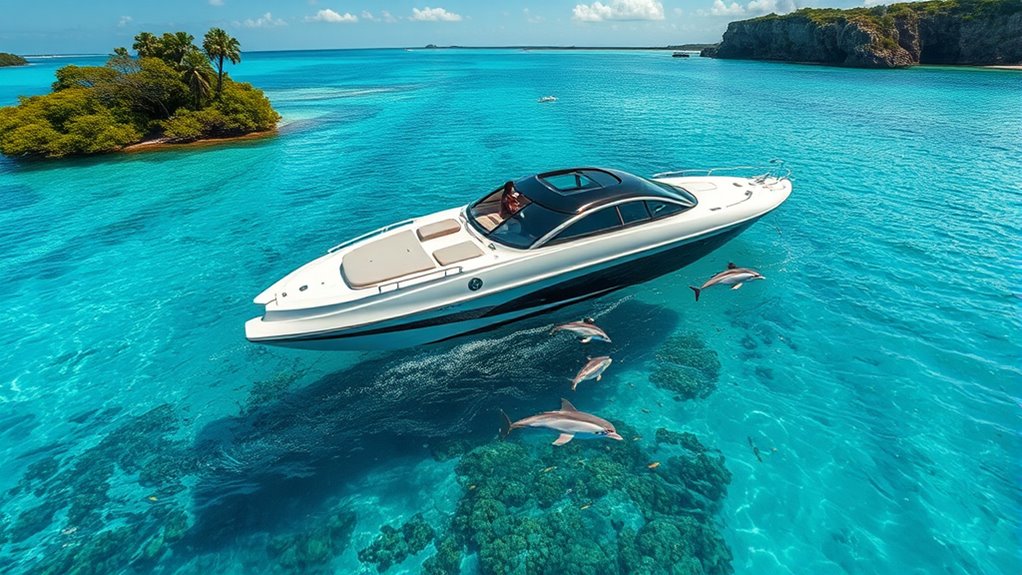
When you operate a jet boat near sensitive marine areas, it’s essential to prioritize the health of local ecosystems and wildlife. Stay at a safe distance from breeding grounds and nesting sites to avoid disturbing animals. Keep noise levels to a minimum, as loud sounds can stress marine life and disrupt their natural behaviors. Never feed or approach wildlife, which can alter their natural feeding habits and make them vulnerable. Be cautious with your wake; large waves can erode coastlines and disturb seabed habitats. Always follow local regulations and guidelines designed to protect marine environments. By respecting these ecosystems, you help ensure they remain healthy and vibrant for future generations, preserving the beauty and diversity of the waters you enjoy.
Supporting Sustainable Waterway Practices
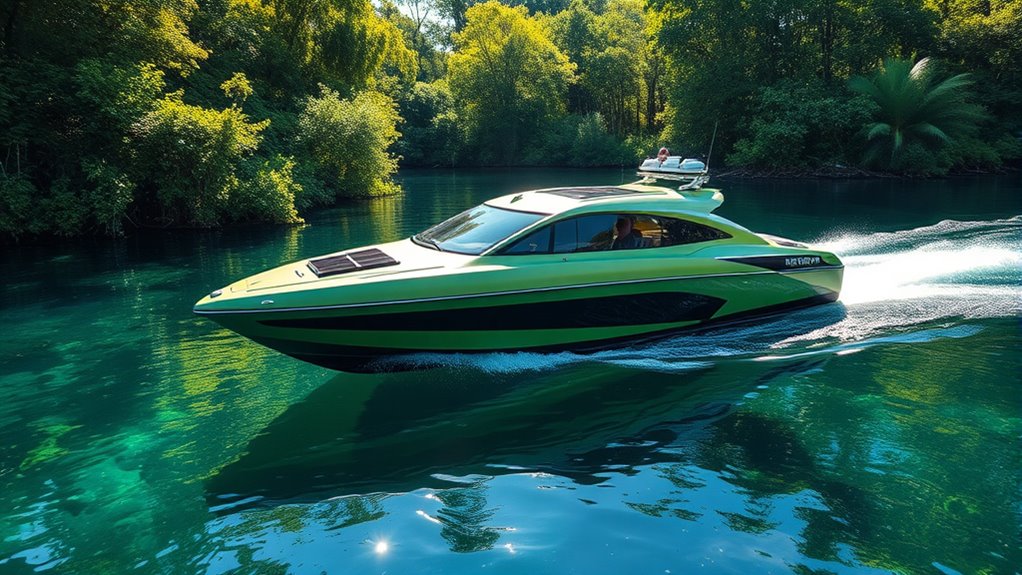
Supporting sustainable waterway practices requires you to actively minimize your environmental impact while enjoying the waters. To do this, focus on three key actions. First, always follow designated boating routes to prevent erosion and protect fragile habitats. Second, properly dispose of waste—bring containers for trash and avoid discharging pollutants into the water. Third, use eco-friendly fuels and propulsion systems to reduce emissions and water contamination. Additionally, limit your speed in sensitive areas to prevent wake damage and disturbance to wildlife. By adopting these habits, you help preserve water quality and aquatic ecosystems. Your choices directly influence the health of waterways, ensuring they remain vibrant and accessible for future generations. Supporting sustainable practices is essential for balancing enjoyment and environmental responsibility.
Educating and Encouraging Fellow Boaters
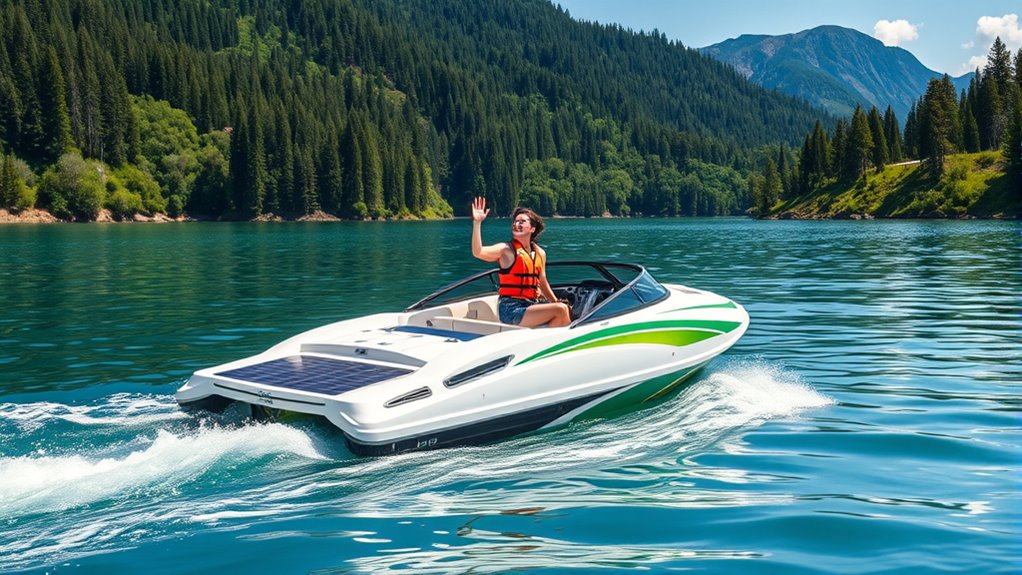
Educating and encouraging fellow boaters is essential for fostering a culture of environmental responsibility on the water. You can share your knowledge about eco-friendly practices, such as proper waste disposal and avoiding sensitive habitats. Lead by example—use eco-conscious gear, minimize fuel use, and keep noise levels low. When you see others engaging in harmful behaviors, kindly offer advice and highlight the benefits of sustainable boating. Organize or participate in local clean-up events to promote teamwork and awareness. Spreading awareness creates a ripple effect, inspiring others to adopt eco-friendly habits. Remember, your actions and words influence your fellow boaters, helping to build a community committed to preserving our waterways for future generations. Your leadership can make a significant difference in promoting sustainable jet boating practices.
Staying Informed on Eco-Friendly Innovations
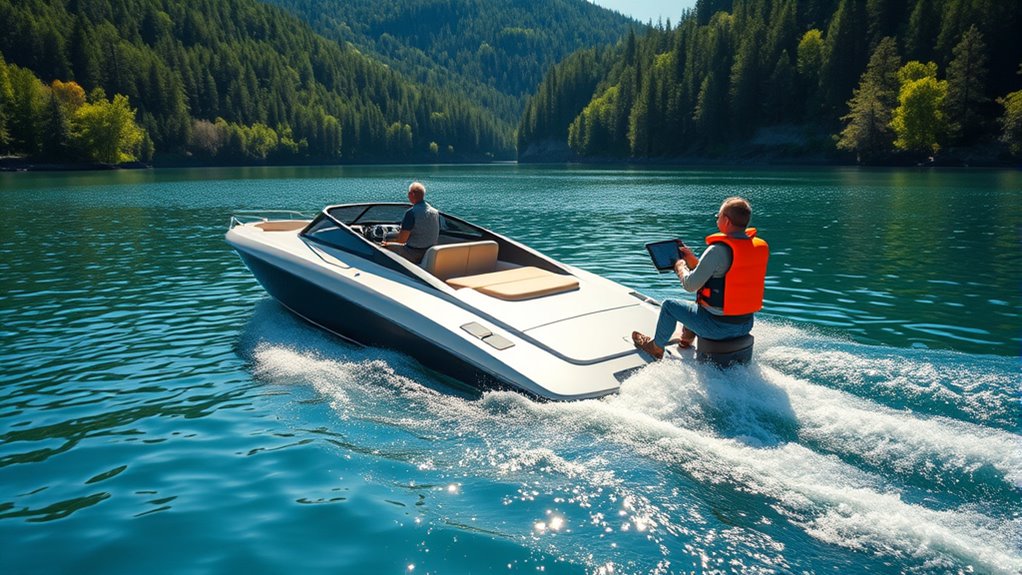
Staying informed about eco-friendly innovations is essential for keeping your boating practices sustainable and effective. By actively seeking new developments, you can adopt smarter, greener techniques. Consider these three ways to stay current:
- Subscribe to industry newsletters and eco-focused boating magazines to receive updates on new technology.
- Attend workshops, webinars, or conferences dedicated to sustainable boating practices.
- Join online forums and social media groups where enthusiasts share eco-friendly tips and innovations.
Remaining up-to-date helps you implement the latest eco-conscious solutions, like cleaner propulsion systems or biodegradable products. It also allows you to connect with experts and fellow boaters committed to sustainability. Being informed empowers you to make smarter choices, reducing your environmental impact and enjoying your adventures responsibly.
Frequently Asked Questions
How Can I Measure the Environmental Impact of My Jet Boating Activities?
To measure the environmental impact of your jet boating activities, start by tracking fuel consumption and engine emissions regularly. Use apps or logs to monitor these details, then compare them to eco-friendly benchmarks. You can also observe changes in local wildlife or water quality around your boating areas. Engaging with environmental organizations for assessments or using eco-impact calculators can give you a clearer picture of your overall footprint.
Are There Eco-Friendly Certifications for Jet Boating Equipment?
Your quest for eco-friendly jet boating equipment is crucial, as it can transform your impact from a mere ripple to a tidal wave of change. There are certifications like the Green Seal and EcoLogo that recognize environmentally friendly gear, including engines and accessories. These certifications guarantee your equipment meets strict standards for reducing emissions and pollution, helping you boat responsibly while protecting the waterways you love.
How Do Weather Conditions Affect Eco-Friendly Boating Practices?
Weather conditions greatly impact eco-friendly boating practices. When you face strong winds, heavy rain, or extreme heat, you might need to modify your plans to minimize environmental harm. For example, avoid operating during high winds that can disrupt wildlife or cause erosion. Rain can lead to increased runoff, so you should be cautious about fuel spills. By monitoring weather forecasts and adjusting your activities accordingly, you help protect the environment and ensure your safety.
What Are the Best Eco-Conscious Alternatives to Traditional Boat Cleaning Products?
Imagine a sparkling lake, untouched by harsh chemicals, when you choose eco-conscious boat cleaning alternatives. You can switch to biodegradable soaps, vinegar solutions, or plant-based cleaners that break down naturally without harming aquatic life. These options work just as well as traditional products, letting you maintain your boat’s shine while protecting the environment. By making this simple switch, you help preserve the beauty of nature for everyone to enjoy.
Can Eco-Friendly Jet Boating Practices Extend the Lifespan of My Boat?
You might wonder if eco-friendly jet boating practices can help extend your boat’s lifespan. By using sustainable cleaning and maintenance methods, you reduce the buildup of harmful residues and corrosion, which can damage your boat over time. Additionally, eco-conscious practices often include proper waste disposal and regular care, helping preserve your boat’s condition. So, yes, adopting eco-friendly habits can contribute to a longer, healthier life for your boat.
Conclusion
By choosing eco-friendly equipment, maintaining your jet boat, operating responsibly, minimizing noise, and respecting the environment, you become a steward of our waterways. Supporting sustainable practices, educating others, and staying informed empower you to protect marine ecosystems. Together, you and fellow boaters can create a cleaner, healthier waterway. Embrace eco-friendly jet boating practices to preserve nature’s beauty, ensure safety, and enjoy the water responsibly for generations to come.

